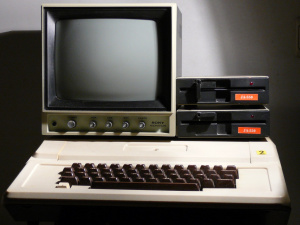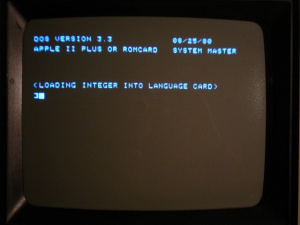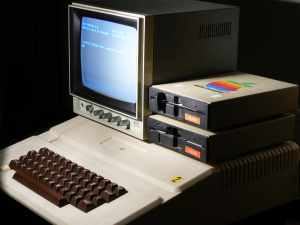Difference between revisions of "AppleII"
m |
|||
| Line 54: | Line 54: | ||
== Data Exchange == | == Data Exchange == | ||
| + | [[File:P1010851.resized.JPG|thumb|]] | ||
Using [http://adtpro.sourceforge.net/ ADTPro] over the audio/cassette port allows to transfer disk images (.DSK) to and from physical 5 1/4" floppies. | Using [http://adtpro.sourceforge.net/ ADTPro] over the audio/cassette port allows to transfer disk images (.DSK) to and from physical 5 1/4" floppies. | ||
Latest revision as of 00:48, 6 January 2011
Contents
Showcase Setup
- Apple II Plus (Kuen Hwa clone) with following cards:
- slot 0: 16KB RAM expansion "language card"
- slot 3: 80 columns display card
- slot 4: Z80 "soft card" for running CP/M (t.b.t)
- slot 6: Disk II interface card
- Sony PVM-90CE monochrome monitor
- Dual floppy drive.
Other Pieces
- ITT 2020: an Apple II europlus clone:
- Power supply seems broken, doesn't give good voltages, now removed.
- Untested
- ZD ucom: another Apple II clone with a numeric keypad
- Power supply is removed
- Untested
- Expansion cards:
- D780C (Z80 clone)
- Disk II + Shugart
- Unidentified, has a 26 pin flat cable connector and only an EEPROM and 74LS ICs.
- Unidentified, TV modulator ?
Origin
The Kuen Hwa clone, some cards, the Sony monitor and a full height disk drive was donated by the University of Antwerp around 1993. The monitor is rumoured to have been their first computer display. The other computers, the dual diskdrive and some cards where purchased later in the 1990's to replace the broken disk drive.
Condition
- The showcase setup is in working condition, although:
- The computer has it's logo badge is missing.
- The monitor starts to make an awful noise when it gets hot.
- The disk drives don't seem to be very reliable
Software
I'm able to run following software:
- Apple DOS 3.3 with various programs:
- Visicalc
- Games: Castle Wolfenstein
- Prodos 8 v1.9 with ADTpro
- CP/M with various programs:
- DBase
- COBOL-80
- Turbo Pascal
- GBASIC
Data Exchange
Using ADTPro over the audio/cassette port allows to transfer disk images (.DSK) to and from physical 5 1/4" floppies.
Tons of images can be found here
It takes about 20 minutes for a 180KB disk side, requires trial-and-error adjusting of mic and headphone volume on the PC side and good audio cables. Once it's set up it is fairly reliable.
Also of interest: manipulate prodos disk images with AppleII::ProDOS
Usage Hints
Upon power-on the Kuen Wha simply shows COMPUTER on the top of the screen and infinitely tries to boot from disk. You can escape to BASIC by pressing RESET.
The ITT starts in monitor.
Monitor
You are in the built-in system monitor if you see the star prompt:
*
Press ctrl-B return to switch to BASIC
Applesoft BASIC
The apple II Plus has Applesoft BASIC in ROM. A.k.a floating point BASIC, as opposed to the integer basic of the original apple II.
You are in Applesoft BASIC if you see the bracket prompt:
]
Boot a floppy:
PR#6
Switch to 80 columns:
PR#3
Go into the monitor:
CALL -151
DOS 3.3
For this you need to boot any DOS 3.3 formatted disk. All disks contain the OS. The OS just adds some extra commands to BASIC:
CATALOG RUN <program>
ProDOS 8
For this you need to boot a ProDOS system boot disk (not all ProDOS disks contain the OS). Usually a ProDOS disk boots a menu and you can quit to BASIC.
The OS adds some extra commands to BASIC:
CAT RUN <program>
CP/M
Make sure you have the Z80 card installed and you connect your screen to 80 columns or you don't see anything happening.
Survival commands:
CAT <program_name_without.COM> B:
Done
Restoration of the ITT 2020
Connected a PC power supply. Reseated the CPU and ROMs. Now it starts up in monitor. CTRL-B brings you to Applesoft BASIC.
Connected the known good disk drives in slot 6 and tried to boot any disk (dos, prodos) by doing PR#6 starts loading but then halts with an error:
** RELOCATION / CONFIGURATION ERROR **
Wrote a memory test program in BASIC. This pinpointed that bit 1 of address $5105 and bit 4 of $9000 were stuck on. Translating this to the motherboard layout I knew exactly which RAM chips to replace. I stole them from the ZDucom, they are regular 4116's. Problem solved!
It now boots Prodos etc. But games (using high res graphics) show vertical stripes. I tried replacing the 74LS194 at B4 but it didn't help. I'm guessing that it is actually an incompatibility of the 2020, that it has an 9'th bit in the first 16K that is displayed in highres mode. Using HGR> and plotting in BASIC works fine, but the binary loaded image obviously only fills 8 bits, the 9th bit being random yielding the vertical bars.




